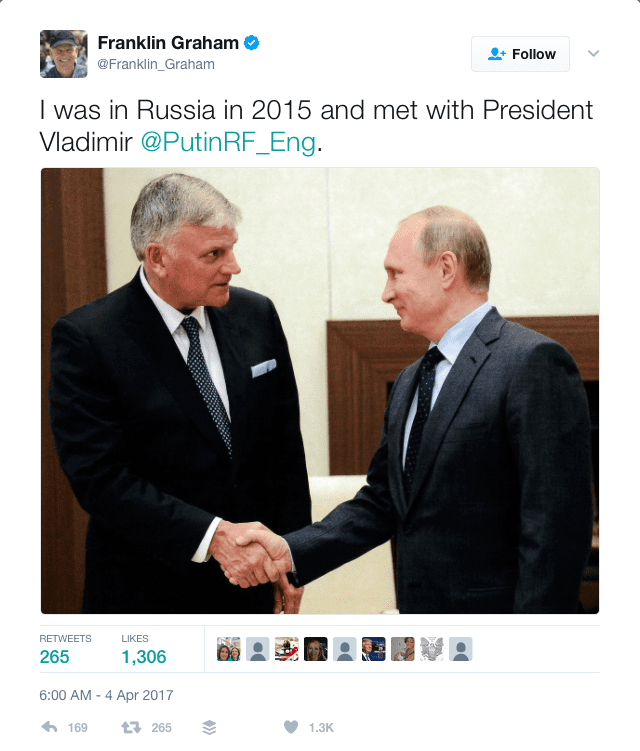In late 2015, Franklin Graham visited Russia to meet with leaders of the Orthodox Church. During this visit, Graham also had the opportunity to meet with Vladimir Putin. Graham brought up this visit in April while defending Putin against accusations of election meddling, posting this image to his twitter:

Graham’s reference to this 2015 meeting in turn brought up comments he made at the time praising Putin for banning “gay propaganda” and effectively criminalizing the LGBT rights movement. As RightWingWatch reported in November 2015:
In a trip to Russia last week, U.S. Religious Right leader Franklin Graham praised President Vladimir Putin’s protection of “traditional Christianity,” including the passage of the 2013 “gay propaganda” law that effectively criminalizes pro-gay-rights speech and advocacy.
In an interview with the Moskoviskij Komsomolets newspaper, Graham criticized President Obama for supporting “policies that contradict the teachings of God” and repeated his praise of Putin for “protecting Russian young people against homosexual propaganda,” adding that “homosexuals cannot have children, they can take other people’s children,” according to a transcript the newspaper provided of the interview…
In 2014, Graham wrote an article praising Putin’s crackdown on homosexuality:
In my opinion, Putin is right on these issues. Obviously, he may be wrong about many things, but he has taken a stand to protect his nation’s children from the damaging effects of any gay and lesbian agenda.
Our president and his attorney general have turned their backs on God and His standards, and many in the Congress are following the administration’s lead. This is shameful.
The world used to look to America for moral leadership. But those days are long gone.
Today, we’ve abdicated our moral leadership.
Yes, really—Graham claimed that on gay rights, the U.S. had abdicated its moral leadership to Russia. Of course, you likely know that I am writing this post in the aftermath of revelations of gay torture camps in Russian Chechnya.
According to one survivor who managed to escape the gay torture camps the country has set up, police are telling parents of gay men to “sort it out” or they will take matters into their own hands.
“They tell the parents to kill their child. They say ‘Either you do it, or we will,’” an unidentified male told France 24 News. “They call it: ‘Cleaning your honour with blood.’
The truth is that words have consequences. Putin’s hardline against homosexuality—which Graham praised—gave the Chechen president space to crack down harder on gay and lesbian residents in his own corner of Russia. Words have consequences in the U.S., too—gay teens kicked out of their homes and high teen suicide rates due to anti-gay bullying, to begin with—but in the U.S., secular laws and secular norms mean that, regardless of evangelicals’ rhetoric, secular authorities are not going to round up, imprison, torture, and kill gays and lesbians.
Within the U.S., evangelicals are used to being able to inveigh against gays and lesbians without having their literal blood on their hands. Yes, this rhetoric still has consequences—and people do still die (see teen suicides as referenced above). But the causality feels less direct. American evangelicals do not have to watch as gay and lesbian individuals are murdered. Of course, some evangelical leaders would like to see gay and lesbian individuals rounded up, imprisoned, tortured, and even killed. But I suspect that most evangelicals in the U.S. today would balk at such a course of action, and acknowledge it as barbaric and wrong—even if they believe homosexual behavior is sinful.
I worry that the perceived lack of consequences attached to their rhetoric may make evangelicals like Franklin Graham blind to the impact their words have. In theory, making it a crime to expose young people to material or ideas that normalize homosexuality sounds good to Graham—after all, evangelicals frequently inveigh against kindergarten teachers reading books like Heather Has Two Mommies in public school. They call it gay indoctrination. It’s not surprising, in this context, that Graham would praise Putin’s law. But Graham does not have to live in Russia, and watch the consequences.
It’s all very neat and tidy, inveighing against homosexuality from within a country that protects gay and lesbian individuals’ right to free speech, to life, and to liberty (if not their freedom from employment discrimination). It means Graham doesn’t have to watch as gay and lesbian individuals are sent to jail for speaking in favor of their rights in Russia, as gay and lesbian individuals live in hiding and terror in Uganda, as gay and lesbian individuals are rounded up, tortured, and killed in Russian Chechnya. I mention Uganda because we’ve seen this before—cases where evangelical leaders export their ideas to other countries, with dire consequences and in a far more lethal form.
Gay and lesbian individuals in the U.S. are not rounded up, imprisoned, tortured, or killed because gay rights activists have worked tirelessly for decades to prevent these things from happening. And they’ve been successful—they’ve changed public opinion and have gained public acceptance. But the fact that their efforts have been foiled in the U.S. does not give American evangelicals the license to forget that arrests, imprisonment, torture, and killings is where their rhetoric leads. And where it has led, in other countries—and is leading today.
Evangelicals need to be held responsible for this rhetoric. And we can start with Franklin Graham, who has blood on his hands.
I have a Patreon! Please support my writing!














